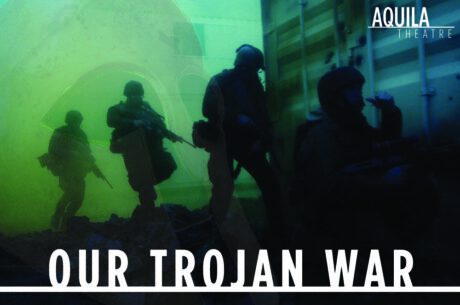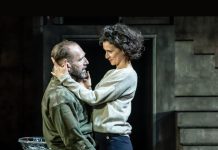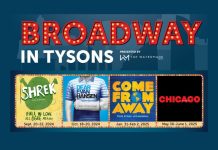Let me not then die ingloriously and without a struggle, but let me first do
some great thing that shall be told among men hereafter.
― Homer, The Iliad, ‘Book 22’ (Tr. R. Fagles)
Do ancient plays about war and warriors still have relevance to modern audiences? Can classics connect with those now at a great distant between those who in military service and the 99% of Americans who are and will remain civilians? Does it matter? Should we care?
The award-winning Aquila Theatre (with a major grant from the National Endowment for the Humanities) thought asking such questions are key to American democracy continuing to thrive. Under the leadership of founder Peter Meineck and director Desiree Sanchez, Aquila developed, and is now touring the country with Our Trojan War and the newly created the Warrior Chorus.
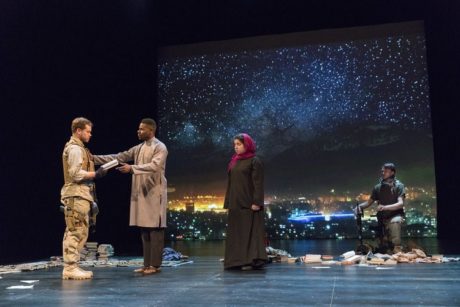
The Aquila Theatre Warrior Chorus is a major humanities program that will train military service veterans to present scholar-led public programming based on classical literature. The classics will include The Illiad, The Odyssey, Antigone, and The Aeneid to name just a few. These classics of the ancient Western cannon were selected given their direct associations with war, conflict, comradeship, home, and family and government.
In a recent performance at the Alden Theatre in McLean before Our Trojan War heads to BAM/Brooklyn Academy of Music) with its motto, “the home for adventurous artists, audiences and ideas” I had the opportunity to interview Peter W. Meineck, PhD. Professor of Classics in the Modern World, Director of Graduate Studies, Classics Department, New York University.
Our Trojan War is well described by this Aquila synopsis:
“In Our Trojan War, a group of US soldiers are sent on a mission to search home in a remote village of the Middle east, but when a cadre of hidden books of some of the world’s most renowned ancient text is discovered, questions quickly rise among the solders –“What is our Trojan War today? What enemy must we fight for to preserve our freedoms? “Leadership, justice, knowledge, the marginalized and democracy which are all explored through a mix of ancient works set against the modern-day experience of war.”
As directed by Desiree Sanchez, I found the 80-minute intermission-free performance by a diverse cast raw, real, and admirable. It easily connected ancient texts to the current world of continuing war. The eight member cast included JB Becton, Tyler La Marr, Ryan Wuestewald, Richard Busser, Adrienne Brammier, James Stanton, Anthony Irizarry and Alexandra E. Acosta. That several former military service members including Brammier, La Marr and Stanton were performing on the stage with veteran stage actors added to its impact. They had been there in the chaos and fog of war. They knew of what they spoke. But this is a column; not a review. It is a column to get to the heart of “the” why for Our Trojan War and the Warrior Chorus development by Aquila Theatre. This column is based upon an interview with Peter Meineck.
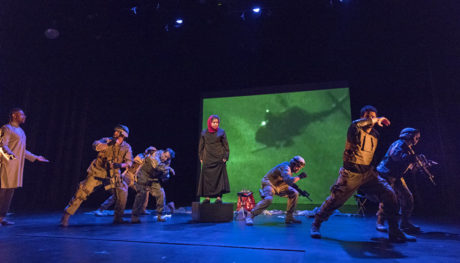
David Siegel: What was the impetus to develop Our Trojan War with the Warrior Chorus ?
Peter Meineck: Originally we wanted to present a dramatic version of the way we had been using ancient texts in our veteran programs. This is reflecting personal experiences of war and homecoming against Homer, Aeschyus, Sophocles, Euripides et al. I have found that veterans often understand these works at a very deep level based on their own experiences. Perhaps this is because the ancient authors were all veterans themselves and using mythic material to articulate the tensions in their own society. Since the election, this idea developed into something perhaps even more urgent. We sensed that people on both sides of the political spectrum are very much in the moment right now and that suddenly we are all addressing deep questions about the nature of our democracy and culture.
With this in mind, the concept of Our Trojan War is now not only reflective on our recent past wars and their impact on us, but poses the question “what is our Trojan War today?” I think it is the fight for the kind of democracy we want to live in and we are asking fundamental questions. What is a democracy exactly? What kind of democracy do we want to live in? How do we preserve and protect the democracy we have? How do we feel about tyranny, oligarchy, autocracy? These are all Greek terms and the ancients can help us better understand many of the important questions.
Why is it important to tour Our Trojan War at this moment in time?
It’s a matter of urgency. We are witnessing dialogue being reduced to soundbites, tweets and political posturing. Our news channels are now just arguments, sensation and spectacle. Policy is introduced by tweets! Theatre can help reverse this by bringing people together with other people away from the singular experience of social media or TV. It can also introduce the complexities of an issue in a way that provokes emotion and empathy. Right now we need a good deal more empathy. Veterans are great people to communicate these kinds of important issues – they have demonstrated their commitment to their society by serving and often placing themselves at great personal risk and they are representatives of all of us, every gender, ethnicity and social group. They can also help bridge the gap between left and right. They have earned the right to be heard.
What would you like audiences to come away with after attending Our Trojan War?
I want them to feel they have experienced a compelling and exciting evening of live theatre, something they cannot get from staying home with a screen. I would hope they might be provoked to think about democracy, leadership, ethics and power on a deeper level. I would also hope that seeing some of these ancient texts enlivened on stage, they might gain some of the wisdom of the ancients and perhaps want to experience more. I hope we can empower people by contextualizing some of the tensions and fault lines in our own culture.
If you could invite audiences, what would you say to them?
That in a democracy we are all directly responsible for what the government does in our name and if we are unwilling or unable to serve in the military, as voters we have a responsibility to understand the cost of war as we consider the leaders we want. I think it’s essential that the gap between the military and civilians is narrowed and that we understand that war changes everything and even though we might not have felt our wars in our everyday lives, they have a profound effect on our society and the societies we wage war on. Many veterans have also experienced the edges of human existence and have much to teach us about our humanity. I think we should value our veterans as citizens who have gained a certain wisdom, often through suffering, that tends to reject overly simplistic political messaging. We have a lot to learn from our vets.
Our Trojan War played one night only on Saturday, April 1, 2017 at The Alden Theater McLean Community Center – 1234 Ingleside Avenue, in McLean, VA. For tickets to other Alden Theater productions click here.
Note: The Alden Theater and McLean is undergoing a complete renovation and it will be closed for the next 18 months. Updated information can be found here.


